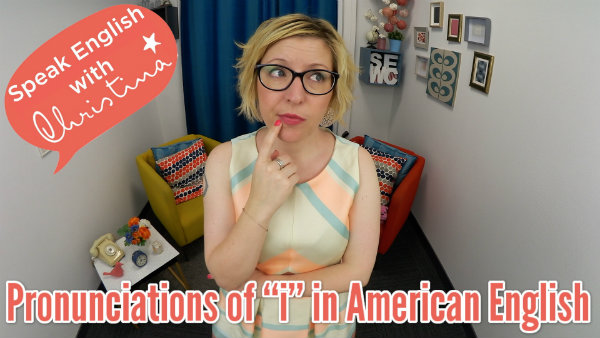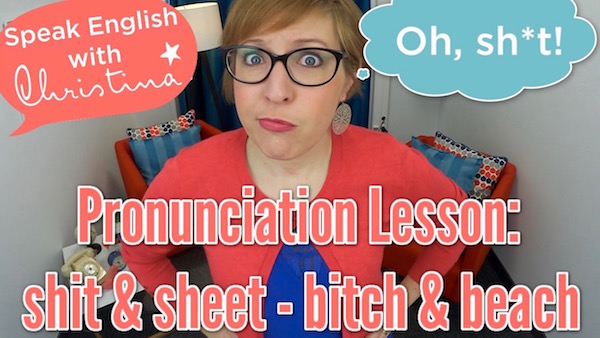
Hi there! I’m your English coach Christina, welcome to Speak English with Christina, where you’ll learn American culture and business know-how to become confident in English.
How would you pronounce these words?
- Taxi
- Timer
- Bitter
- Machine
- Octopi
Pronouncing “I” can be messy in English, and if there’s one pronunciation question that students ask the most it’s this:
“How can I know how to pronounce the letter “i” in words?”
“Is it /ih/ like in “sit”Or /ee/ like in “taxi”? Or /aï/ like in “light”?”
Has it ever happened to you, that you pronounced “i” incorrectly?
Or you were hesitant to make conversation for fear of mispronouncing?
Today, you’ll learn how to avoid these situations, and continue the conversation fluently, knowing the 3 ways of pronouncing the letter “i” in words.
Let’s go!
Pronunciation of “i”: The rules
You can pronounce the letter “i” in several ways.
Sometimes, we pronounce it /ee/, in four main cases:
1st – At the end of a word with several syllables. As in “taxi” or “jacuzzi.”
2nd – When “i” is followed by a vowel. As in “studio,” “audience,” “curious.”
3rd – When “i” is followed by an “e”, a “c” then another silent “e”. As in: “piece”, “niece”, or “believe”
And finally, 4th – In “ing”. As in “finger”, “acting”, “eating”…
Some other times, “i” is pronounced as “/ih/”. It’s a “short i”. We find it it “closed syllables” that end with a consonant.
For instance, one-syllable words such as “sit”, “big” or “mist”. Or in longer words where the letter “i” is followed by several consonants in a row. Especially when they’re doubled! As in “spinner”, “bitter”, “beginning”, or “bewildering”.
Finally, a third way to pronounce “i” is like… “I”. A long /ai/, that we find in “open syllables” – such as when the letter “i” is followed by a consonant then a vowel, especially a silent “e”. As in “rising”, “smile”, “wide”, or “timer”.
We also use long /ai/ before a silent g or a silent s, as in “light”, “might”, “sigh”, “sign” or “island”… and at the end of one-syllable words. Like “pi”, “wi-fi”, “hi” or… the letter “I”!
The (many) exceptions
That was a lot of rules! And yet you’ll find a lot of exceptions too! Let’s clear out a few of them right away.
First, in some words, “i” is pronounced /ee/ for historical reasons that you might find a bit random. As in: “machine”, “pizza”, “casino”, “naïve”…
Second, when the “i” is at the end of words that are plurals of Latin words, we pronounce it “i”. Words like “cacti”, “fungi” or “octopi”, for instance. Not words you’ll use every day, but good to know (you can impress your friends).
Third, in some words, the silent “e” doesn’t always open the preceding syllable, so in words like “give” or “to live”, or “notice”, the “i” is pronounced /ih/ and not /ee/.
Finally, I have to admit: the rules I told you are guidelines, at best.
Most of the times, you need to learn the pronunciation of the word by itself. You could learn each rule, but at some point it’s harder to remember the things that explain the differences in pronunciation of:
- “Christ / mist”
- “itinerary / iteration”
- “child / build”
- “possible / bible”
- “line / linen”
- “bison / vision”
You’ll have to practice a lot, listen to a lot of English, and figure out which “i” are open syllables and which are “closed” syllables.
The Great Vowel Shift: The reason for the complexities
These different pronunciations have a simple explanation: they’re not from the same language!
Indeed, in English, the spelling of words often comes from Middle English, the language of medieval England.
However, since then, the pronunciation experienced what we call the Great Vowel Shift. Over a few centuries, English people progressively changed a lot of their pronunciation, to build what’s now our Modern English language.
They stopped pronouncing the “e” at the end of words and double consonants, for instance, but they still kept the spelling.
So don’t worry! If you find the English pronunciation difficult, it’s not your fault: you’re only the victim of a giant medieval prank designed to make you struggle!
I have one very effective tip for you. Your best friend to improve your vocabulary and pronunciation is: your notebook! If you carry one around as you practice the English language, you can write down the spelling AND pronunciation of any new word you find.
Be sure to watch the episode, to hear how to pronounce all these words correctly:

Now, tell me: did you know how to correctly pronounce the words in the list at the beginning?
Write your answer in the comments, I’d love to hear from you!
Want to immediately understand 12 everyday expressions that Americans say fast?
Get my free pronunciation and comprehension lesson with exercises.
Just click the here to get it now.
And of course subscribe to my channel, so you get a new English lesson each week! Thanks for watching Speak English with Christina, and I’ll see you next time!

More good stuff...
Click the image to learn more








Thanks a lot .
You’re welcome!
Hi Lena ! Great blog ! Could maybe add “Italian” , looks similar to other words starting with “it-“ but pronunciation is different
Lovely lessons!!!
You’re really funny!!
Your English pronunciation is adorable!!
I wonder how can I learn to write the pronunciation like dictionaries.
Congratulations for your teaching
And thanks a lot!!!
Thanks so much Elisa, I’m glad you’re enjoying the lessons!
As for writing pronunciation, there’s a very good app to help you become familiar with the International Phonetic Alphabet. It’s the Macmillan Sounds app. I especially like it because it has both the British and the American phonetic alphabets.
You can find it here: http://www.macmillaneducationapps.com/soundspron/
Have fun!
Hi Christina… thanks for having found many rules when it comes to “i” pronunciation…
There are other cases we can pay attention to: it’s the sound /ə/ / ɜ:/ Br pronunciation or /ɚ/ /ɝ/ American pronunciation with a “i” in many words such as “bird”, “stire” or the sound /eə/ British pronunciation and /ɛ / American pronunciation in many words such as “this”.
For sure, pronunciation in English is definitely not a no-brainer issue! I started English from scratch and realized that it’s absolutely facinating to the point I have just turned to be a coach (in English and in French) specialized in accent reduction in a Group called “Boost your English to a Big E and French to a big F”.
French is a tricky language as well, when it comes to pronunciation… but rules are more stable with fewer exceptions.
Take care…
FooZee
This is so helpful since I am not an English speaker; it’s tough for me to know when vowels have different pronunciation, I have enjoyed this lesson, and I’m glad I found it.
Hi Flor, I’m glad you found it too! And that it helped you improve something about your pronunciation. What other pronunciation difficulties do you have?
thanks alot medam. you have solved my huge problem.
Great, I’m happy that I could help you!
Hello I wanted to name my son Ibhaan . Ibhan is a Hindu word or name for Lord Ganesh . I want it to be pronounced as ee bhan . Would it be pronounced that way with that spelling But.
As Ivan is pronounced as ai van and evan is pronounced as eh van I’m concerned if Ibhaan will be pronounced in same way beachse once they start going to school I don’t want people to confuse with the pronunciation.
Please suggest .
The wonderful thing about names is that you can spell and pronounce them as you like! The teachers will generally ask on the first day if they come across a name that they would need pronunciation help with.
Hey Christina, I just wanted to make you aware that “Octopi” is a contentious word. From the Wikitionary entry on ‘Octopus’: “The plural octopi is hypercorrect, coming from the mistaken notion that the -us in octōpūs is a Latin second declension ending. The word is actually treated as a third declension noun in Latin. The plural octopodes (Latin: octōpodēs) follows the Ancient Greek plural, ὀκτώποδες (oktṓpodes).”
I thus personally like ‘octopodes’ the best, but ‘octopuses’ or ‘octopus’ are also accepted. However, with the evolution of languages we might se ‘octopi’ as an increasingly accepted form.
Languages are definitely changing all the time, and to be honest, this is the 1st time I’ve actually seen the word “octopodes”! Just goes to show that sometimes there is what is technically correct, and then there is what people really say.
We most often just say “octopuses” or some people might say “octopi”. But if you say “octopodes”, my guess is that no one would know what you’re talking about!
But that could be an opportunity to teach them something about their own language that they might not even know (which is my case here! So thank you for this English lesson 😉
Why “sticky” is pronounced as “e” instead ‘i’ sound?
Actually the “i” in “sticky” is pronounced as a short /i/ sound, just like the words sick, igloo, in, if, illegal, etc. So if you’re pronouncing it like /steekee/, it should be pronounced /stickee/! Good luck with that!
Hi, this is very helpful, and I have a question, it is about the word “heritage”, why in this word a pronounce /i/?
In the word “heritage”, the primary stress is on the 1st syllable /HER/ and the secondary stress is on the final syllable, which is pronounced like /tədj/.
This means that the 2nd syllable, where we see the letter “i” is the weakest syllable in the word. And so it is pronounced with a /ə/ sound, because it would be too much to have 3 stressed syllables in a 3-syllable word!
(The symbol /ə/ represents the schwa. The schwa is a short sound in the English language, like a weak “uh”. For more about the schwa, you can go deep into my video archives and watch this lesson: https://www.youtube.com/watch?v=uz-kuIiPTh0&t= (From 7 years ago, OMG, where does time fly?!)